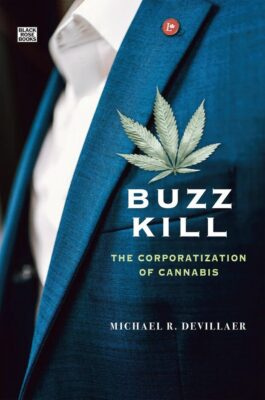In mid-2018, as Canada counted down toward that October’s adult-use cannabis legalization, reports emerged that licensed cannabis producers had already bought up enough commercial cultivation property to produce some 50% more than the amount of cannabis Canadians were estimated to be able to consume annually. This was bad news, since cannabis could not be commercially exported.
Months ahead of legalization, large cannabis companies like Canopy, Aurora, and Hexo invested in gargantuan production facilities – not realizing they would not be able to scale growing to these environments without a massive decline in product quality. In the first year of legalization, consumers and reviewers alike found legal cannabis overall significantly worse than what had always been available on the illicit market.

Buzz Kill
The Corporatization of Cannabis
Michael R. DeVillaer
Black Rose Books
$30.00
paper
408pp
9781551647951
This is only a scant section of the cratered history of legalization that Michael DeVillaer lays out in Buzz Kill: The Corporatization of Cannabis. DeVillaer – an assistant professor in Psychiatry and Neurosciences at McMaster University, and an associate with the Centre for Medicinal Cannabis Research, among others – makes a long series of different arguments throughout the book, but his primary one is that this all could have been done differently, starting from its very inception.
Like many with an eye toward public health and social justice rather than economic bonanza, DeVillaer was and remains an advocate of a non-profit decriminalization model. While that ship likely sailed during the Harper years, it’s an instructive alternative approach: what if instead of a legalization scheme designed to make money for entrepreneurs, investors, and tax collectors, we simply allowed noncommercial cultivation and consumption of cannabis? Calling on research that refutes assumptions that illicit cannabis is connected to other criminal enterprises, DeVillaer imagines how Canada could have changed its legal stance on cannabis without resorting to the flailing corporate model we ultimately got.
However, DeVillaer points out, there was too much politics for this to occur. Even as Stephen Harper and his puritanical non-scientists tried to clamp down on medical cannabis in the early 2010s, they effectively created a model Liberal party associates could exploit as they developed their legalization project. DeVillaer lists the impressive number of high-level ex-federal Liberals (and mercenary, hypocritical Conservatives) represented on the boards and executives of Canadian cannabis firms going into legalization.
This is still only a faint scraping of the material in Buzz Kill, and that is unfortunately the book’s Achilles heel. Not only is it overstuffed with information (including fifty-one pages of references), but the information is enormously wide-ranging. DeVillaer seems to be aiming for a total book about drugs, including cannabis, into which he can deploy and examine the example of Canadian legalization. At this, his success is limited: he routinely presents fascinating and surprising facts and findings, but often about subjects that seem only distantly related to the subject at hand.
The most striking example of this tendency is that the first section of the book, roughly eighty pages, doesn’t really discuss cannabis at all, but rather serves as a ballpark social, medical, and legal history of drug consumption, drug prohibition, and drug promotion. This section is often engaging, but it’s confusing to recall that one is reading a book about cannabis but hasn’t yet got to the part about the cannabis.
Buzz Kill looks a lot like an academic book (DeVillaer cites and refers freely to a wide variety of research), yet it’s also a chatty social and political history of many things to do with cannabis and legalization. On top of that, the book also incorporates biographical asides about DeVillaer’s experiences as a young researcher learning about drugs and decriminalization. While all of these are readable, the disparate sections feel at odds with one another: each of these aspects might easily have been fleshed out into three different books.
Deeply researched, Buzz Kill is an often thought-provoking account of the bureaucratic, social, legal, and ethical mess of cannabis legalization. Perhaps with a subject as muddled as this, one might expect a book that has to do a lot just to tell the basic story. DeVillaer adds to the muddle with his big-tent approach to discussing ideas: no matter what you expect this book to be, you’re likely to find a more varied array of subjects and arguments than you were anticipating. In many ways that can be engaging: DeVillaer writes with such a conversational voice that it takes a minute before one realizes he’s not speaking about what one expected, or what one feels is relevant.
What Buzz Kill does very well is remind us how this could all have been undertaken very differently, and that Canadians might have had a more holistic, non-profit framework for legal cannabis than the one we got, which prioritized businesspeople with no prior connections to cannabis cultivation. The system we ended up with is a mess, and an idea-saturated book in a consistent hurry to dash madly off in several directions may be a suitable reflection of our current legal reality.mRb






0 Comments